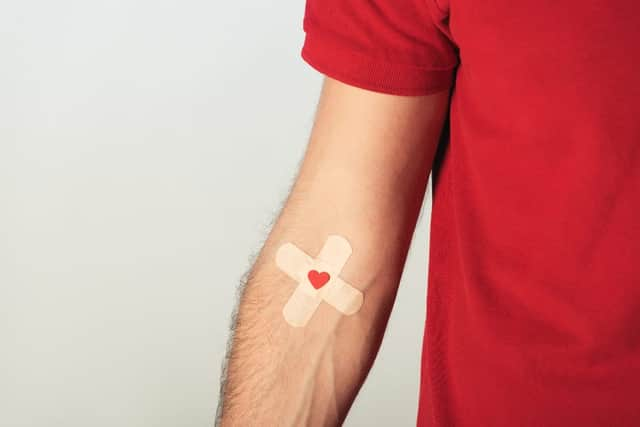Your blood plasma could help treat coronavirus sufferers - here’s who the NHS is looking for


Men over 35 who have recovered from coronavirus with hospital treatment are being asked to donate antibody rich blood plasma to help cure others with the virus.
Initial findings from tests carried out on blood plasma donations taken from recovered Covid-19 patients by NHS Blood and Transplant (NHSBT) have revealed three key groups of people who are most likely to have potentially life-saving plasma.
Advertisement
Hide AdAdvertisement
Hide AdPeople who have recovered from Covid-19 and fit into these three categories are now being urged by officials to donate.
NHSBT is collecting convalescent plasma as part of a larger coronavirus treatment trial, which, if successful, will be used in hospitals across the country.
The plasma of recovered patients can be given to those whose own immune response is lacking.
What are the three key groups?
Officials are seeking donors whose plasma has the highest levels of antibodies, as they will be more likely to keep donating for several months to come, and help more people recover.
Advertisement
Hide AdAdvertisement
Hide AdThe Associate Medical Director for blood donation at NHSBT, Professor David Roberts, said, “These testing results mean we want to hear from those who want to give convalescent plasma and especially want to hear people from men, the over 35s, and all people who needed hospital treatment.”
The more categories a person falls into, the higher their production of antibodies is likely to be, and the more they have to donate.
What is convalescent plasma?
A statement on the NHSBT’s website explains that “plasma is a clear liquid found in your blood that is used for transfusions.
“It makes up about half of your blood volume and carries red and white blood cells and platelets around the body. After a virus, your plasma contains antibodies used to help fight infection.
Advertisement
Hide AdAdvertisement
Hide Ad“Convalescent plasma is the antibody-rich plasma of someone who has recovered from a virus, in this case COVID-19.”I fit into one or more of the required categories, how can I donate?
The NHSBT has explained that the plasma donations must be taken no earlier than 28 days after a donor has fully recovered from Covid-19.
The NHSBT also seeks those who live near or within commutable distance of one of its 23 donor centres.
“If you have recovered from a coronavirus infection, fall into any one of these groups, and live near or could travel to one of our 23 donor centres, please contact us on 0300 123 23 23 or www.nhsbt.nhs.uk,” urged Professor Roberts.
The full list of NHSBT centres is available below:
Advertisement
Hide AdAdvertisement
Hide AdBirminghamBradfordBristolCambridgeGloucesterLancasterLeeds City CentreLeicesterLiverpoolLondon EdgwareLondon TootingLondon West EndLutonManchester Plymouth GroveManchester City CentreNewcastleNottinghamOxfordPlymouthPooleSheffieldSouthamptonStoke
‘I needed to do it’
Alessandro Giardini, a Consultant at Great Ormond Street Hospital from Camden, fell into each of the three categories and as predicted, had plasma with highest antibody levels donated to the health authority so far.
His antibody levels were roughly 40 times that of the typical donation and he has made more than 400 convalescent plasma donations so far.
Talking about his recovery from Covid-19 to The i Mr Giardini said, "I ended up on a ventilator in the Intensive Care Unit for seven days, I was in the hospital for 15 days in total.
Advertisement
Hide AdAdvertisement
Hide Ad"I was aware of the convalescent plasma donation programme so I was expecting the call to come in and donate. I felt I had to give back.
“Even though it was scary to go back into a medical environment and have a needle again, I really felt that if there was any chance I could help someone else who was still ill with Covid-19, that I needed to do it.”